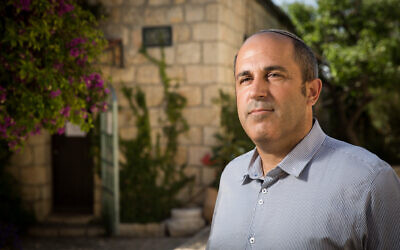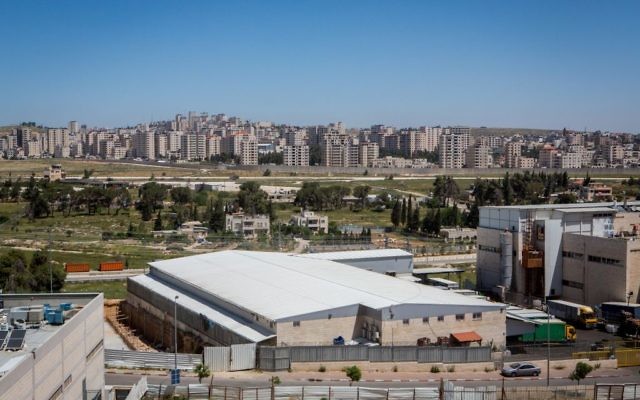Project will add 176 homes to Nof Zion, located in Jabel Mukaber; Housing Ministry said to revive another plan for up to 11,000 units on site of Atarot Airport
By TOI STAFF
Work started in recent weeks on expanding a Jewish community in East Jerusalem which, once completed, will make it the largest Jewish enclave in an Arab neighborhood of the city, Haaretz reported Wednesday.
The project will add 176 housing units to the existing 96 homes of Nof Zion, which sits in the Arab neighborhood of Jabel Mukaber.
Currently, the largest Jewish presence in any Arab neighborhood in the city is the 106 families of Ma’ale Zeitim on the Mount of Olives, located in Ras al Amud, according to the report.
The Nof Zion expansion was approved two years ago by the Jerusalem Planning and Building Committee after a group of Jews was said to have purchased the land.
Jerusalem councilman Arieh King, who backs Jewish settlement in East Jerusalem, welcomed the development and told Haaretz that a further 300 housing units are expected to be approved for the community.
“I am very happy that this significant project in terms of the extent of building and the number of housing units around the Old City is moving forward and is in progress,” he told Haaretz, noting there is great demand for the apartments.
King said additional construction is also planned for other similar Jewish communities inside Palestinian neighborhoods.
However, Aviv Tatarsky, a researcher with the Ir Amim rights organization, said the project is a further obstacle to Israelis and Palestinians being able to share the city.
The construction is “symbolic of the government’s choice to prevent the possibility of an agreement in Jerusalem,” he said. “Jerusalem is a bi-national city, and therefore it will be good for Israelis only when it is good for the Palestinians.”
Nof Zion was set up as a privately funded Jewish community in 2000 and the first families moved in around eight years ago.
The land zoned for the expansion was purchased by Jerusalem businessman Rami Levy in partnership with Australian entrepreneur Kevin Bermeister, one of the founders of the Skype internet phone call service.
In another potentially significant development for East Jerusalem, the Construction and Housing Ministry is preparing a proposal to build up to 11,000 housing units on the land of the defunct Atarot Airport, the Israel Hayom daily reported Thursday.
The plan had been repeatedly stalled in the past due to diplomatic considerations but then-housing minister Yoav Gallant ordered it be revived immediately after US President Donald Trump was elected to office in 2016, according to the report.
Jerusalem Mayor Moshe Lion, Jerusalem Affairs Minister Ze’ev Elkin, and Ofer Berkovitch, leader of the opposition Hitorerut (Awakening) party on the Jerusalem City Council, all back the idea and a plan is to be presented to the Jerusalem District Planning Committee within a few months.
The Trump administration is not expected to oppose the project as long as construction permits are not immediately issued, the report said. Earlier this month, Washington announced a change in US policy according to which it no longer sees Israeli settlements as a violation of international law.
The Atarot Industrial Area, located next the airport, is currently the largest industrial park in Jerusalem, covering over 150 acres and home to some 180 factories. In January, businessman Levy opened a shopping mall in the zone, serving Israelis and Palestinians.
Atarot Airport, on the northern outskirts of Jerusalem, has not been used since the outbreak of the Second Intifada in 2000 when Palestinians shot at aircraft using the airstrip.
In the past Israel offered the Palestinians a chance to jointly reopen the airport but the idea was rejected by the Palestinians, who claim the area as part of East Jerusalem, Israel Hayom reported.
Palestinians want the eastern part of the city as the capital of a future Palestinian state.
Israel took control of East Jerusalem in the Six Day War of 1967 and later extended sovereignty over it in 1980, in a move never recognized by the international community.
Israeli decisions to build in East Jerusalem invariably draw international condemnation. Israel rejects this, saying all of Jerusalem is the undivided capital of the Jewish state.
While Israel considers all building in any part of Jerusalem legitimate, building projects marketed for Jews in the heart of Arab neighborhoods have stirred up tensions and are seen by many Israelis as more controversial than Jewish-majority neighborhoods over the Green Line that are set apart, such as Gilo.






There will no problem to find buyers for the apartments in both locations.